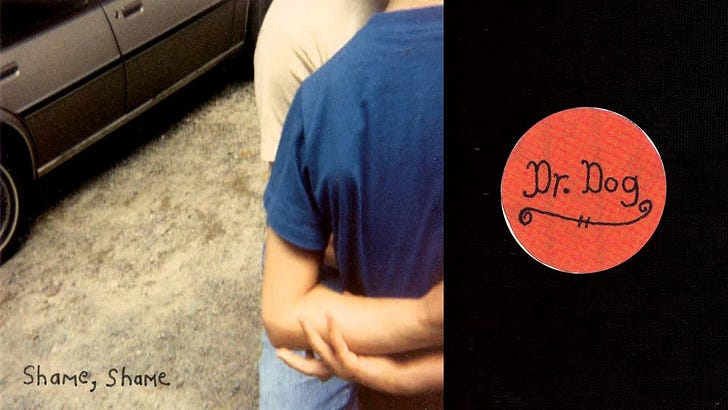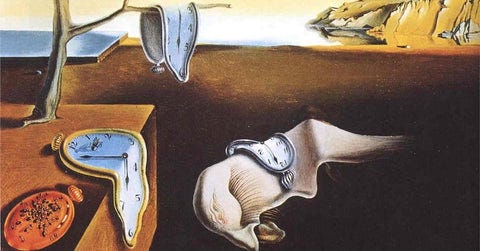Hymns to the Silence: 5 Songs to Mark the End the Year
This week's songs are from Dr. Dog, Fairport Convention, Waxahatchee, Van Morrison, and Robyn Hitchcock with John Paul Jones
As a parent of young kids, the whole idea of going out on New Year’s Eve seems absurd. But even before having kids, I only had the typical night-on-the-town maybe two or three times. The most memorable celebrations I did have were reasonably intimate gatherings with a group of friends. At least one was over by 8pm. My teens on through college, more often than not, we were out in Colorado skiing. New Year’s presented an opportunity to get up early and enjoy a far less crowded mountain.
No one is here for the hot takes, but I’ll offer one anyway: partying on New Year’s Eve is for suckers.
As I see it, I guess with an outsider’s perspective, New Year’s Eve is a bizarre anti-climax to the holiday season. It marks the end of a whirlwind six-week sprint of parties, travel, shopping, cooking, wrapping, decorating, family get-togethers and traditions. So it feels like the first time in a long time where there’s really nothing that needs doing. It’s a brief pause before day-to-day life picks back up.
But New Year’s is like a cultural birthday. There is a gravitational pull that comes with recognizing the passage of time. It can get into your head. The feelings that come up in that time could be any combination of optimism, trepidation, or an acceptance that not a whole lot will change just because the calendar does.
If for whatever reason you find yourself in a similar frame of mind, why not lean into it? Enjoy the peace and quiet.
Songs that come to mind off the top of my head about the new year can revel in euphoric, drunken glee and loaded with optimism (“In the New Year” by the Walkmen); they can define a period of time as something to be survived (“This Year” by the Mountain Goats), stand in defiance (“New Year” by the Breeders), or to question whether anything will change (“New Year’s Day” by U2, “New Year” by Beach House, “Seasons” by Future Islands). There are of course countless songs about midnight, and the possibilities the hour brings (look no further than “Round Midnight” by Thelonious Monk and “Midnight Hour” by Wilson Pickett).
Here are 5 songs that grapple with the passage of time, self-acceptance, and renewal; they invite us to take a breath before the new year starts.
“Oh, so you’re going to start ‘meditating’? You’re planning on getting into ‘mindfulness’?? Want to be ‘one with yourself’ in the New Year? I’ve got three words for you: Let It Bleed. Stones album from ’69. Ever heard of it? That’ll purify your black heart. Call me when you’ve achieved Zen.” - Anthony Bourdain
Dr. Dog - “Where’d All the Time Go?”
My first live music experience coming out of the pandemic was a Dr. Dog show. Fittingly, they opened with this tune. It’s got everything you want in a Dr. Dog song: It starts off with a wistful lament, an almost child-like sweetness to the melody, lyrics asking all the right questions, the “ooh-aah” backing vocals, and it bounces its way into a rocking finish. The singer is struggling with the loss of a loved one, but the song is more about disorientation and the tricks memory can play by granting us a frustratingly limited means of time travel. Lyrics underscore this sense of disorientation; they are loaded with contrasts: up/falling, bottom/above, fast/slow, being stuck in a shadow, but still blocking shade. The hard lesson comes with the final line: “And when the tide rises, somebody sinks and is gone in the blink of an eye.” The best contrast of them all is that on the page, this seems like it’s a sad song, but as played by Dr. Dog it is a celebration.
“I don’t find it to be sad. Great music is always uplifting to me. She was so young when she wrote it but it pinpoints exactly the feelings I have now, at 71. It also resonated strongly with me when I was a teenager. Love and loss portrayed so sweetly. A song for all ages.” - Linda Thompson
Fairport Convention - “Who Knows Where the Time Goes?”
This song was made famous by Judy Collins, but originally written by Sandy Denny, who was a member of British Folk Rock band Fairport Convention. Fun fact: Denny is the only vocalist to get a singing credit with Led Zeppelin not named Robert Plant. After leaving Fairport Convention, she recorded a stunning solo version of this song for her own release that really showcases her voice and an incredible inner longing. The Fairport Convention version fits a bit more to the theme, because there’s a comfort to it thanks to a very well paced bass line to give it that easy movement, and lead guitarist Richard Thompson adding a melodic uplift. Slightly muffled and distant, a little distorted; it’s that late-60s sound that you wish more guitars would still sound like. The lyrics are from the perspective of someone unmoored from time, as if the whole construct is one of nature’s mysteries. Everything is cyclical, but fleeting. For Sandy Denny, there was a beautiful freedom in that.
Waxahatchee - “Burns Out at Midnight”
This week’s whole theme is predicated on the assumption that you’re taking a quiet night at home over a night on the town. If you’ve bought into that, by default you can identify with this song.
Maybe you had a brat Summer. I had a Tiger’s Blood Spring and Manning Fireworks Fall. MJ Lenderman is a central figure on both albums, and here he is singing harmonies with Katie Crutchfield aka Waxahatchee. She’s singing about the various ways one can run out of steam. Her melodies bend, wind, and zig zag so much you barely notice that it’s all sitting on top of just two chords. Staying up late can have its advantages, but they pale in comparison to those that come with knowing your limitations and accepting them. Cheers to that.
“I don’t need to probe what I do. You know? It comes naturally. It is what it is, as they say. There’s not a lot of intellectual pondering about what I’m doing, it’s very kind of instinctive and intuitive, and that’s it.” - Van Morrison
Van Morrison - “Dweller on the Threshold”
The original rock critic and Van Morrison superfan Greil Marcus trashed a number of albums Morrison released in the 1980s, including Beautiful Vision. He dismissed them as “almost heroic in their tedium.” I couldn’t disagree more; this album is an absolute treasure. I say this as a high compliment: the experience of listening to this album sounds like you’re listening to a VHS tape. This is especially true on “Dweller on the Threshold.” It’ not just the cheesy low-rent science fiction cover, but the sound quality. There is an endearing datedness to it, but it avoids all of the cliches of early-80s production. It sounds loose and perfectly imperfect; there is a hint of wobble in the guitar effects and the microphone muffles and pops on a few syllables. It sounds like both the past and the present, while Van the Man is singing about the future. Joining Van Morrison on this spiritual quest is Pee Wee Ellis and film composer Mark Isham in the horn section, and Mark Knopfler on lead guitar.
When the midnight disappears/ I will walk out of the darkness/and I’ll walk into the light/ and I’ll sing the song of ages/ and the dawn will end the night
Apparently influenced by the writings of New Age philosopher Alice Bailey, this is Van at his most mystical and searching. (Read any interview with him and it’s hard to believe he’s capable of being either.) According to this pseudo-religion, the “Dweller at the Threshold” is a manifestation of all of the darkness a person has accumulated that appears at a key transition point in one’s spiritual journey. It must be defeated in order to move into the higher spiritual plane. Van sings as if he’s been waiting for his moment and is ready to take action. He is done with the questioning. He’s made up his mind and is ready to become a more enlightened version of himself on the other side of the night. That’s kind of a New Year’s Eve thing to do.
Robyn Hitchcock & John Paul Jones - “Not Dark Yet” (Bob Dylan Cover)
If this video is your first introduction to Robyn Hitchcock, Billy Bragg gives a perfect summation of the man and his work while bringing him to the stage at this Bob Dylan tribute show.
Dylan’s original version of “Not Dark Yet” is perfect. Elegiac. Epic. Poignant. A rare glimpse into his humanity. It’s probably somewhere in my top 10 Dylan songs. With his work cut out for him, Hitchcock brings John Paul Jones up with him on mandolin to account for the absence of Daniel Lanois’ drippy and spectral production on the original recording. Somehow, this version establishes its own pace and exudes so much atmosphere you can feel it through a YouTube video. While the song can feel ominous on the surface (especially in Dylan’s original recording), Robyn Hitchcock’s version suggests there is a level of hope as well. The success of this version comes down to one fundamental difference: Dylan sings it like he’s prepared to be up and waiting out the night, but Hitchcock sings it like he’s singing someone to sleep. This reframes the metaphor of the approaching darkness. It is no longer something to be feared; the darkness offers a quiet peace before whatever comes next.
Thanks for reading. Enjoy the listening. Happy New Year.





Dweller on the Threshold is a supremely underrated track. There’s a great live version (from a BBC performance I think) on a bootleg aptly titled “And if you get it right this time”.